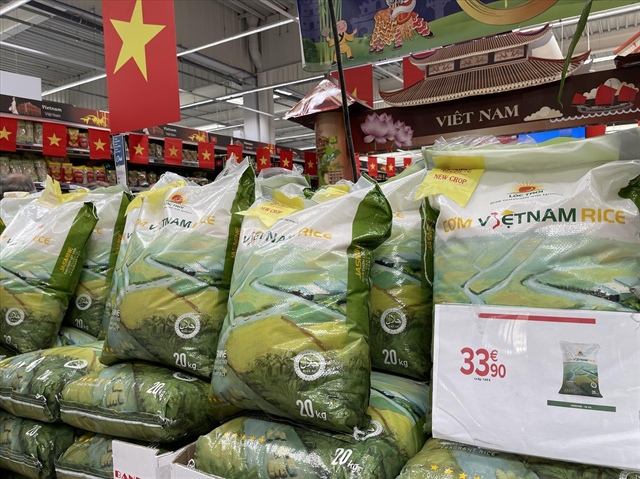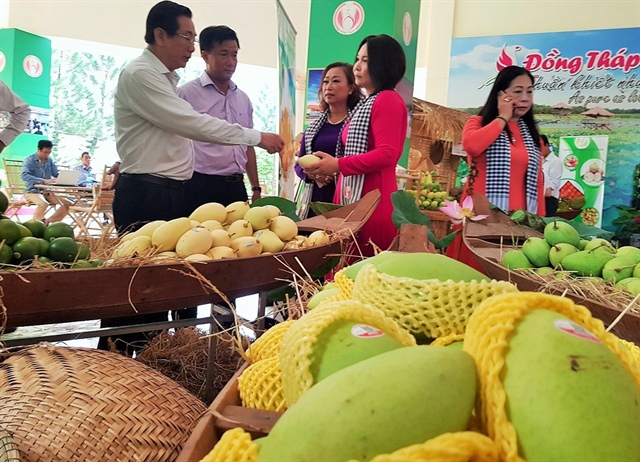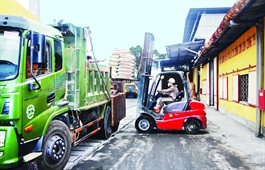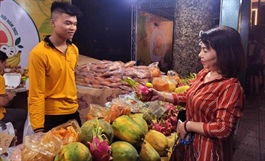Agro-forestry-fishery exports set to reach target
Agro-forestry-fishery exports set to reach target
The Vietnamese agro-forestry-fishery sector is hopeful of reaching its 2022 US$50 billion export target in view of continued positive signals from importing markets.
Positive signals for rice, fruit
Vietnamese ST25 rice variety created by agricultural engineer Ho Quang Cua recently accessed the UK and received positive feedback from the Asian consumer community there, affirming the quality and strengthening the position of Vietnamese rice on the world market. The “Com Vietnam” rice brand products of the Loc Troi Group have already reached the shelves of France’s Carrefour supermarket chain. According to the Vietnamese trade office in Japan, Vietnam’s ST25 rice has been used to process dishes on the menu of the Japanese Cabinet Office.

Vietnamese rice on French supermarket shelves |
Deputy Minister of Agriculture and Rural Development Phung Duc Tien said that under favorable conditions, Vietnam can export 6.5-6.7 million tonnes of rice with value expected to reach US$3.2-3.3 billion this year.
Regarding fruit exports, 51 planting area codes and 25 packaging facilities have been recognized as qualified for durian exports to China.
The wood sector saw slower export growth in the first eight months of 2022 compared with the same period last year. However, the export value was six percent higher due to increased prices. Notably, wood pellet and woodchip exports to the EU, Japan and other Asian countries increased as consumers in these markets seek alternatives for gas.
|
Internal difficulties
Agro-forestry-fishery exports still face challenges. For the seafood sector, the European Commission’s yellow card against illegal, unreported and unregulated (IUU) fishing is a growing concern.
Nguyen Quang Hung, Deputy Director General of the Directorate of Fisheries, said a European Commission (EC) delegation would arrive in Vietnam soon to inspect fishing ports and see how Vietnam has implemented the four European recommendations in order to get the IUU yellow card lifted. These include (1) completing the legal framework; (2) strengthening the management of fishing vessels; (3) enhancing the traceability of fisheries from fishing activities; and (4) law enforcement.
However, the yellow card is not expected to be removed after this inspection and Vietnam may even risk a red card, banning its seafood from the EU market. Reasons for this possible sanction include inadequate infrastructure of fishing ports and a lack of qualified technical staff for control of fishing activities. Since the beginning of this year, 62 fishing vessels have been detected as violating foreign territorial waters, many of them lacking voyage management systems.
Tran Quang Bao, Deputy Director General of the Vietnam Administration of Forestry, said the forestry sector will face numerous difficulties in the last four months of the year, including competition, increased transportation costs, and inflation, and high inventory levels of importing companies. Moreover, a US trade defense investigation of Vietnamese kitchen cupboards is underway.
Economists predict that changes in the world economy, especially energy prices, will continue affecting the domestic commodity market. Tightened credit and origin fraud charges are also becoming challenges for agricultural exports.
Despite these difficulties, Deputy Minister Phung Duc Tien said the agricultural sector is striving to achieve its US$50 billion export target in 2022.
Tran Quang Bao said that if the export growth remains as stable as in August, the foresetry sector will be able to realize the US$16.4 billion target for 2022.
| According to data from the Ministry of Agriculture and Rural Development, in the first eight months of 2022, Vietnam exported nearly US$36.3 billion worth of agro-forestry-fishery products, up 13.1 percent year-on-year. The export value of seven products/groups of products exceeded US$2 billion: coffee, rubber, rice, fruit and vegetables, cashew, shrimp, and wood products. |


























